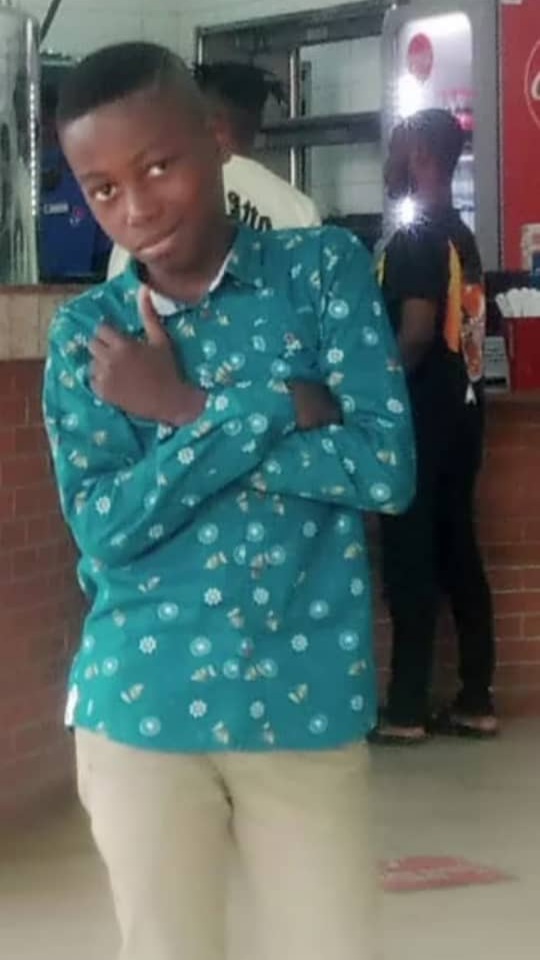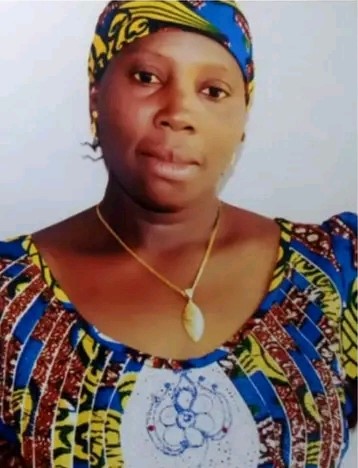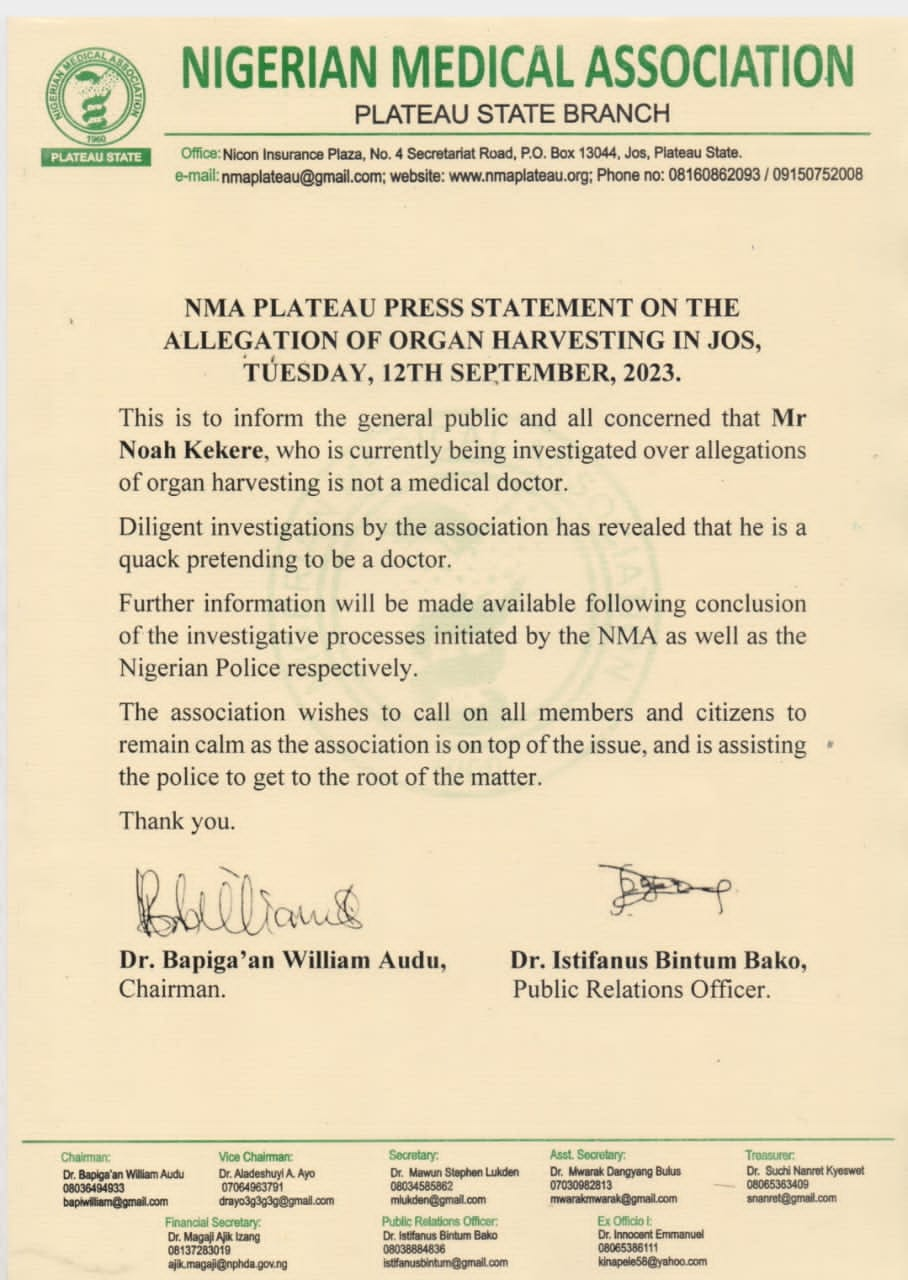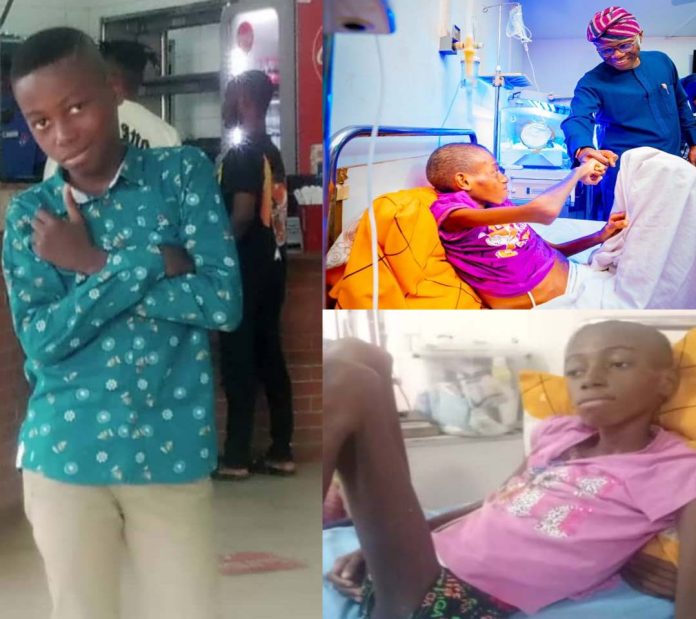A growing shadow looms over Nigeria’s healthcare landscape as an unsettling trend of organ harvesting in some hospitals is emerging, generating apprehension among Nigerians.
A hospital, which is a place typically associated with healing and solace, is unfortunately gradually becoming a place that conceals a darker and more disturbing reality of organ harvesting within healthcare facilities.

Recently, it was discovered at the Lagos State University Teaching Hospital (LASUTH), that the small intestine of a 13-year-old boy, Adebola Akin-Bright, was missing.
Adebola’s medical journey began with a ruptured appendix in March, leading to an initial surgery at a private hospital in Lagos. After two weeks of recovery, he seemed to be on the mend.
However, three months later, he faced a complication of intestinal obstruction, necessitating another surgery at the same hospital. Unfortunately, seven days later, there was still leakage from his intestine, prompting a transfer to LASUTH.
On July 17, another surgery was performed, but the shocking revelation came afterward when the lead surgeon called after the surgery to inform Adebola’s mother that they did not see his small intestine when he was opened up. The victim’s family is currently left with unanswered questions.
As things stand now, a surgical procedure meant to improve Adebola’s quality of life had taken an unimaginable turn, leaving him without a small but critical part of his digestive system.

Again, a 45-year-old woman named Mrs. Kehinde Kamal allegedly had her right kidney removed during a surgery unrelated to the organ.
Her husband, Mr. Kehinde Busari Kamal, reported one Noah Kekere to the Nasarawa Gwong Police Division, accusing him of removing one of his wife’s kidneys during an appendicectomy at the Murna Clinic and Maternity in Jos, Plateau State, in 2018.
The accused, known as ‘Yellow,’ had been practising as a doctor in the community for over 25 years and was known for charging lower fees and performing surgeries on credit. The NMA declared him an impostor in the wake of the Kamal allegation.
According to Kehinde’s husband, Kekere had informed the Kamal family that Mrs. Kehinde needed urgent surgery for her appendix. However, they said, Kekere seized the opportunity to remove Kehinde’s right kidney during the procedure and the victim only found out years after when she developed a health issue.

Mrs. Kamal narrates that she began experiencing pain on the right side of her abdomen and weakness six months after her discharge from Kekere’s hospital. Despite seeking medical attention and receiving pain relief drugs from Kekere, her condition worsened over the years.
In 2023, she went to Jos University Teaching Hospital (JUTH) for a scan, which revealed that her right kidney was missing, the same side where the appendix was supposedly removed by Kekere.
The police ordered another scan at Fertile Ground Hospital in Jos, which also confirmed the absence of a kidney. Mrs. Kamal stated that she had never undergone surgery before 2018, having given birth to her four children vaginally at JUTH.
It was later discovered that the accused doctor, Noah Kekere, is not a licensed medical doctor but was operating as one. According to the Plateau chairman of the Nigerian Medical Association (NMA), Dr. Bapiga’an William Audu, investigation revealed that Kekere was a quack pretending to be a doctor. He is currently in police custody.
Nigerians react
These heart-wrenching incidents have continued to instill fear in the mind of Nigerians as they called for very urgent attention from the medical regulatory bodies and the government.
A banker working in Lagos, Mrs. Olayinka Asa, lamented the recent developments, saying, time has come when relatives will begin to follow patients into the theater to closely monitor and observe activities of medical practitioners.
“I am very scared because I feel everyone must be on the guard, including women delivering through Cesarean section. The trust that citizens place in healthcare providers must be reinforced, while the rights of patients must be protected with unwavering diligence,” Asa stated.
there is a lot of decadence in the system as a whole and there is too much room for quackery in the country -Physician
A corps member, Shekwodusa Alkali, stressed the need for due diligence as well as seek second-party opinion from experts and other health facilities on health matters. She also advised Nigerians to investigate the genuineness and capability of medical practitioners and facilities before patronising them.
In response to these incidents, Dr. Riyike Ogunyemi, a Public Health Physician in Lagos, said the case of the 13-year-old boy may not involve organ harvesting but rather mismanagement, possibly involving bowel resection without proper parental notification.
On the other hand, the Jos woman’s case, according to her, has revealed that the perpetrator was not a licensed medical doctor.
“I do not think that the issue of the 13-year-old was that of organ harvest but mismanagement and probably had some form of bowel resection done without proper notification of the parent. Whereas, investigation on the other case of the Jos woman, has revealed that the perpetrator is not a medical doctor.
“The incident shows how desperate human beings can be and how we really do not have human feelings for ourselves. I also feel that there is a lot of decadence in the system as a whole and there is too much room for quackery in the country. I believe those are areas that the country really needs to look at and devise ways to salvage the situation,” Ogunyemi said.
Ideally, before a patient is taken into the theater, he should know the nitty-gritty of the surgery to be performed on him
On the way forward, Dr. Ogunyemi recommended the strengthening of laws for effective prosecution of quacks, while she encouraged individuals to conduct due diligence when seeking healthcare, even though paying for healthcare services out-of-pocket can be inconvenient.
“As individuals, try as much as possible to do due diligence when it comes to where you access care. It is unfortunate that most of the time, people have to pay for healthcare services out-of-pocket, which is not convenient because nobody plans to fall ill. So, when they fall ill, the payment for healthcare services is usually not budgeted for. As such, people tend to go for what is readily available and seemingly affordable; but the truth is that in the long run, the quack hospitals are not affordable when compared to government hospitals and health centres.
“If you enter a hospital and you are not comfortable with the personnel attending to you or for any reason, you suspect that the person is not professional enough, you have a right to leave. We also need to start to look at litigation, even in well-established organizations where you have proper standard and protocols put in place.
“Ideally, before you take a patient into the theater, that patient should know the nitty-gritty of the surgery you want to perform on him/her. The patient should have an idea as much as possible the extent, likely outcome, the plus and minus of the surgery.
“It is the duty of the surgeon to explain in detail what the surgery is all about. Wherein, having understood, the patient goes ahead to sign. Note that the moment you sign a consent form, it means you understand and agree with the doctor and you give your consent.
there should be room for relatives to be able to observe to an extent surgical procedures
“So, in cases where patients are uncertain of what the doctor is talking about, they do not have to sign the consent form under duress. If you are uncertain and need more information, you request. Your doctor has a responsibility to explain to you until you understand as much as possible, then, you make an informed decision either to go ahead and sign the consent form or explore another option available to you. This, most times, has nothing to do with level of education because as doctors, we know how to relate with our clients, whether elite or uneducated.
“Having understood the entire process, if anything otherwise happens, that patient has a legal right to sue the doctor and the hospital, whatever the case may be,” she added.
Dr. Ogunyemi further suggested the possibility of allowing relatives to observe surgical procedures to ensure transparency and understanding.
“Though, we haven’t gotten to that level in this part of the world, I think that there should be room for relatives to be able to observe to an extent surgical procedures. For the case of the 13-year-old-boy, I was made to understand that when they opened up the boy and saw what was happening in his abdomen, it was beyond what they expected and anticipated. At that point in time, the doctors knew that what they had signed for was far-fetched from what they met in surgery.
“So, there was a need to bring in the parent or whoever is on ground to come, so they can explain the next phase, meaning that ‘what we thought we will find isn’t what we found. This is what we have found now and this is what we think we can do, should we go ahead?’
“Going forward, we should start to contemplate the possibility of relatives being able to observe at least to an extent ongoing surgical procedures. This can be very helpful because if a patient is coming in for a surgery on appendicitis, and you are going somewhere else, as far as the kidney, even if, the relative does not really understand the human anatomy, they at least have a mental picture of what is happening in the theater suite.
“This can help to curb the issues we are having because the patients must have been put to sleep and doesn’t know what is happening, as such, nobody to judge in the case of any anomaly.”
She recommended creating a database for the community to verify the qualifications of healthcare providers.
“There is need for a data base wherein the community can assess to know those who are actually qualified doctors. This will enable people to be able to confirm whether any healthcare provider is licensed to practice or not,” she said.
Also, Doctor Atalabi Foluke of Babcock University Teaching Hospital advised Nigerians to patronise only trusted health facilities, while she emphasized the need for government to put in place measures to keep all medical practitioners in check.
Corroborating the recommendation by Dr. Ogunyemi, Atalabi also said that penalties be meted on doctors and other health workers found guilty of carrying out illegal activities.


